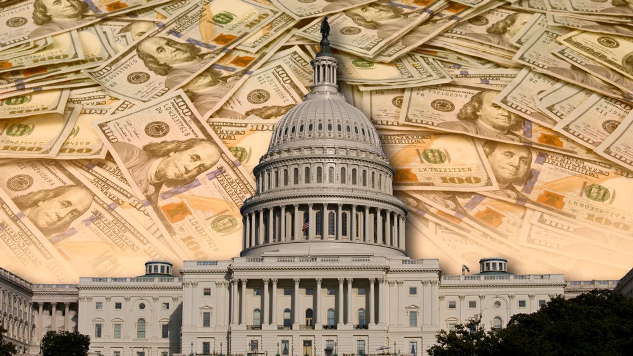
In This Article
- Why America’s corruption problem didn’t start with Trump
- How both political parties helped normalize grift
- What Teapot Dome taught us—and what we forgot
- How Trump monetized the presidency like a casino
- Why foreign regimes are lining up to buy American influence
How Political Corruption in America Led to Trump’s Kleptocracy
by Robert Jennings, InnerSelf.comI turned 80 this year. And after 30 years of writing for InnerSelf.com, I’ve lived through more political corruption than I ever thought possible—and I’ve read extensively about the rest. From Vietnam to memecoins, from Watergate to Trump Tower, I’ve watched this nation slide down the slippery slope of graft. I’ve seen some of it firsthand, and studied the rest closely enough to know the patterns. And honestly? It’s disgusting. What passes for normal today would’ve been a full-blown scandal just a generation ago. But we didn’t arrive at this mess overnight. We got here one shady deal at a time—one revolving door, one loophole, one convenient lie layered over another.
It's important to understand that the corruption we witness today didn’t emerge suddenly from Donald Trump’s administration. It’s a deep-rooted issue that has been growing like mold in a damp cellar for over a century. The American political class, regardless of party lines, has been quietly auctioning off the Republic. Trump's presidency just brought this issue to the forefront.
Let’s be clear: what Trump and his family are doing today—foreign crypto schemes, half-million-dollar pay-for-access clubs, cushy Saudi deals for his son-in-law—are breathtaking in their brazenness. But they didn’t happen in a vacuum. They stand on the shoulders of every scandal we swept under the rug. So let’s roll up that rug and see what’s been festering underneath. This festering corruption isn't just a political issue; it's a matter of public concern. It affects the average citizen, from the quality of public services to the fairness of the justice system. The normalization of corruption erodes public trust in government and undermines the very foundations of our democracy.
Teapot Dome: The Grandfather of Grift
In the 1920s, the Teapot Dome scandal gave America its first taste of high-level government corruption with oil-stained fingerprints. Secretary of the Interior Albert Fall secretly leased federal petroleum reserves in Wyoming and California to private companies, without any competitive bidding. In return, he received a small fortune in bribes: cash, cattle, and even bonds tucked into envelopes. When it all unraveled, Fall was convicted and sent to prison, marking the first time a U.S. cabinet official served time for crimes committed while in office. For a while, Teapot Dome was seen as a national disgrace and a textbook warning of what happens when public trust is sold to the highest bidder behind closed doors.
But rather than becoming a permanent cautionary tale, Teapot Dome slowly morphed into a historical benchmark—something to compare other scandals against, as if corruption were a contest for style points. Politicians and pundits would dismiss newer transgressions with a smug, “Well, at least it’s not Teapot Dome bad.” This mindset—grading modern corruption on a curve—became the fertilizer for even deeper rot. When wrongdoing becomes normalized by precedent, when each scandal stretches the Overton window further, accountability fades and cynicism grows. And that's precisely how institutional decay takes hold—not in explosions but shrugs. The media, once a watchdog, became a lapdog, normalizing and even justifying these transgressions. This underscores the crucial role of independent journalism in holding the powerful accountable and maintaining the integrity of our democratic institutions.
Reagan, Iran-Contra, and the Rise of Shadow Government
Fast-forward to the 1980s, and you land smack in the middle of the Iran-Contra affair—an operation so convoluted and illegal it would’ve made Richard Nixon blush. The Reagan administration secretly sold weapons to Iran, which was under an arms embargo at the time, and funneled the proceeds to Contra rebels in Nicaragua, who were fighting a brutal guerrilla war against the leftist Sandinista government. This not only violated U.S. law and congressional bans but also defied the very principles of democratic oversight. The scheme was run through back channels, off-the-books finances, and private intermediaries—a blueprint for shadow governance that would influence future administrations. It was the deep state before the term became a punchline, and it exposed how easily foreign policy could be hijacked by ideologues and war hawks operating outside legal boundaries.
When the scandal broke, there was a moment—just a moment—where it seemed like the gravity of the crime might matter. Investigations were launched. Testimonies were televised. Indictments were issued. And then... nothing. Most of the key figures either escaped accountability or were later pardoned by President George H.W. Bush, himself deeply entangled in the affair. The American public was sold a narrative of noble intentions gone awry, wrapped in the red, white, and blue. Patriotism, once again, provided a smokescreen. Iran-Contra didn’t just fade from memory—it set a precedent: that high-level criminal conduct could be spun, sanitized, and ultimately forgiven. All you had to do was keep the receipts vague and make sure the outrage didn’t last more than a news cycle.
Clinton and the Foundation Economy
The 1990s ushered in a more refined form of corruption—one clad in suits, press releases, and philanthropic branding. Enter the Clinton Foundation, a sprawling nonprofit that raised hundreds of millions under the banner of global humanitarian work. But behind the scenes, it functioned more like an exclusive club where access to power came with a donation form. Saudi Arabia, Qatar, and a string of wealthy Russian and Kazakh oligarchs wrote hefty checks. Conveniently, many of these contributions coincided with Hillary Clinton’s term as Secretary of State, during which key foreign policy decisions intersected with donor interests. When Clinton lost her presidential bid in 2016, the cash flow slowed to a trickle. The message was clear: these weren’t just donations but investments. And when political returns vanished, so did the investors.
No one was ever charged; to be fair, no smoking gun ever emerged linking donations directly to policy changes. But that’s the beauty of today’s elite corruption—it wears a clean shirt and follows the letter of the law while steamrolling its spirit. As anti-corruption expert Sarah Chayes put it, the Clinton Foundation closely resembles the "charities" run by ruling families from Honduras to Uzbekistan—vehicles for influence wrapped in the language of good intentions. Yet unlike the MAGA grifters who shout their schemes from the rooftops, the Clintons played the long game, hiding behind plausible deniability and bureaucratic opacity. We didn’t challenge it because the rot came with polish and pedigree. The Clintons merely set up a more elegant exchange desk in a town where power and access are the currency of choice.
Bush, Cheney, and the War Dividend
The early 2000s saw corruption take on a militarized form, with the Iraq War as its most profitable theater. Vice President Dick Cheney, once CEO of energy and defense contractor Halliburton, helped steer the nation into a conflict that—surprise—turned into a gold mine for his former company. Halliburton and its subsidiaries were handed billions in no-bid contracts, securing lucrative deals to rebuild the very country the U.S. military was bombing into rubble. The supposed firewall between government and business evaporated. Conflict of interest? Not in Washington. There, it’s called "expertise." The revolving door between public service and private profit spun so fast that it blurred the difference between national and corporate strategies.
This wasn’t about bringing democracy to the Middle East. It was about bringing cash to the balance sheets of war profiteers. From falsified claims about weapons of mass destruction to privatized logistics operations that charged taxpayers $99 for a bag of laundry, every part of the war was monetized. It was a war of choice, sold to a frightened public on a pack of lies, and it ended up enriching a small circle of well-connected elites. And what did the public do when it became clear? Nothing. We sighed, maybe shook our heads, then changed the channel. The Bush-Cheney years weren’t just corrupt—they normalized the idea that war itself could be a business model. And once you start treating war like an investment, democracy becomes collateral damage.
Obama, Wall Street, and the Illusion of Reform
When the global financial system teetered on collapse in 2008, Americans were told that bold leadership was needed to save the economy. Enter Barack Obama, promising hope, change, and accountability. But what we got instead was a bailout for the very institutions that caused the crisis. The architects of financial ruin—banks that gambled with toxic assets, sold fraudulent mortgages, and bet against their clients—were rewarded with taxpayer dollars. Rather than being broken up or prosecuted, these institutions were deemed “too big to fail” and shielded from consequences. While millions of Americans lost their homes, jobs, and retirement savings, Wall Street executives collected bonuses and bought second homes in the Hamptons. Recovery for the few came at the cost of justice for the many.
Instead of draining the swamp, the Obama administration gave it a facelift. The same bankers who had torched the global economy were invited into the White House, some even tapped to help steer the recovery. Timothy Geithner, a bailout insider, became Treasury Secretary. Larry Summers, a deregulation cheerleader, helped shape economic policy. There were no perp walks, no prosecutions—just polite conversations about “moving forward.” The message to the public was unmistakable: steal a loaf of bread and go to jail, but crash the economy, and you’ll be handed the keys to the recovery plan. Obama's failure to hold Wall Street accountable didn’t just deepen economic inequality—it solidified the cynical view that justice is optional for the powerful in modern America. And that disillusionment paved the way for populist anger, ripe for exploitation by the next snake oil salesman who promised to burn it all down.
Citizens United: When Bribery Became Speech
In 2010, the U.S. Supreme Court decided to forever change the relationship between money and democracy. In Citizens United v. FEC, the Court ruled that corporations and unions could spend unlimited sums on political campaigns, framing such spending as protected free speech under the First Amendment. In other words, the more money you had, the louder your voice could be. Gone were the days when campaign finance reform was about limiting undue influence—now, corporate influence was a constitutional right. The ruling didn’t just open the floodgates; it blew them off the hinges. Elections became bidding wars, with Super PACs and dark money outfits turning political campaigns into shadowy arms races. Transparency took a back seat to corporate anonymity.
The implications were immediate and devastating. Wealthy donors and special interest groups could now shape political narratives, fund attack ads, and curry favor with candidates without leaving fingerprints. The average voter’s voice was drowned out in a sea of billionaire-funded talking points. The constituency of American democracy shifted: no longer the public, but the donor class. Elected officials, once beholden to the people, now dance to the tune of whoever signs the biggest check. And let’s be honest—this wasn’t a glitch in the system. It became the system. With Citizens United, political bribery didn’t just become tolerated; it became legal, patriotic, and protected by the Constitution. That decision codified a two-tier democracy: one for those who can pay to play, and one for everyone who’s left watching from the cheap seats.
Trump 1.0: The Grift Presidency
Donald Trump didn’t just blur the line between public service and personal gain—he bulldozed it, paved over it, and built a luxury hotel on top. When he took office, he made it clear that the presidency was not a solemn duty, but a business opportunity. He refused to divest from his sprawling empire, handing it off to his sons while retaining financial interest. Trump International Hotels became de facto lobbying hubs, with foreign dignitaries, corporate execs, and GOP donors booking lavish stays to curry favor. Trademarks in China were fast-tracked. Real estate deals in Turkey raised eyebrows. For the first time in American history, the presidency became a literal extension of a brand. It was like watching Teapot Dome on steroids—only this time, the scandal was livestreamed and monetized.
The gift extended to his inner circle, notably his son-in-law, Jared Kushner. He secured a $2 billion investment from Saudi Arabia’s sovereign wealth fund just months after leaving office, despite being a novice investor with no relevant experience. Meanwhile, Trump’s adult children weren’t just tagging along for the ride; they were building business empires in parallel. Ivanka snuggled up to Chinese investors while Don Jr. and Eric peddled access under the guise of real estate deals. And then came the Trump-branded cryptocurrency ventures—TrumpCoin, Trump NFTs, and crypto schemes promoted by Abu Dhabi-aligned backers. It was a gift without disguise, corruption without shame. If Teapot Dome was a warning, the Trump presidency was the system giving up entirely—waving the white flag and saying, “Fine, sell the damn place.” Never before had a sitting president so openly turned the White House into a cash register, ringing up sales for foreign governments, domestic sycophants, and family businesses.
Hunter Biden: The Mirror Nobody Wants to Look Into
Before anyone on the right starts acting like corruption is a partisan issue, let’s talk about Hunter Biden. Here’s a man who made a career out of being Joe Biden’s son—riding shotgun on Air Force Two, landing board seats in Ukraine and China, and getting paid handsomely for “consulting” work in industries he had no experience in. It was classic influence-peddling dressed up in business casual. While President Biden campaigned to restore dignity and ethics to the White House, one of his final acts in office was to issue a blanket pardon to his son. Sure, it may have been technically legal. But it reeked of the same insider favoritism that Democrats so eagerly condemn when it's someone else’s family cashing in. That kind of move erodes public trust, not just in one party, but in the entire idea of justice without privilege.
This isn’t about whataboutism. It’s about the principle of consistency. You can’t wag your finger at Trump’s circus of corruption while giving your own family a pass just because your tie is blue instead of red. That double standard is precisely why so many Americans have checked out—they see no meaningful difference between a Trump-branded golf course and a Biden-backed nonprofit. To the average person struggling with rent or medical bills, political corruption looks the same no matter the party. When elites protect their own and the law bends only for those with connections, people stop believing the system is meant to serve them. They’re not wrong. They’ve just stopped pretending, and that’s what makes this dangerous. Because when public faith dies, democracy isn’t far behind.
Trump 2.0: Corruption Into the Stratosphere
If Trump’s first term was a crash course in corruption, his second is the PhD program. In just his first 100 days back in office, Trump 2.0 has made every previous scandal look like amateur hour. He began by gutting federal ethics infrastructure—firing inspector generals, defunding oversight offices, and launching a wave of civil service purges that replaced experienced professionals with unqualified loyalists. Agencies designed to serve the public have been stripped down and repurposed to serve him. Then came the mass pardons: approximately 1,500 January 6 defendants, including militia leaders and white supremacists, were granted blanket clemency—not as an act of justice, but as a signal. A reward. A warning. And finally, in a move so brazen it would’ve made Boss Tweed blush, Trump accepted a $400 million Boeing 747 jet from the Qatari royal family—a gift so clearly unconstitutional that it turned the Emoluments Clause into a punchline. This isn’t governance. It’s state-sanctioned racketeering disguised as populism. And the meter’s just getting started.
And then there’s the money trail. The newly created Department of Government Efficiency (DOGE), helmed by Elon Musk, has become a privatization fire sale, with contracts funneled to Trump-aligned firms and Musk-linked ventures. Entire regulatory bodies have been dismantled in the name of “efficiency,” but in reality, it’s just open season for corporate looting. Trump’s family has ramped up global deal-making—pushing new crypto ventures backed by UAE oligarchs, launching unregulated digital tokens marketed to MAGA loyalists, and monetizing access to the White House through a $500,000 “Executive Club.” Enforcement of the Foreign Corrupt Practices Act has been quietly suspended, and the DOJ’s crypto crimes unit has been disbanded. What we’re witnessing isn’t just corruption—it’s the conversion of the American government into a personal ATM for a ruling class with no ideology beyond self-enrichment. Trump hasn’t drained the swamp—he’s turned it into a luxury resort, with foreign despots footing the bill.
The Influence Industry: Think Tanks, Universities, and Lobbyists for Hire
Corruption in America isn’t confined to Capitol Hill—it thrives in the cozy, air-conditioned offices of think tanks, universities, and lobbying firms. These institutions may wear the sheen of respectability, but peel back the veneer and you’ll find deep-pocketed donors with agendas that don’t align with democracy. Authoritarian regimes—from Egypt to Russia to China—have quietly bankrolled Washington-based think tanks that produce “policy research” conveniently aligned with their interests. These aren’t back-alley bribes; they’re multimillion-dollar grants with footnotes. The result? Foreign governments gain intellectual cover and political access, while American voters shape policy in the shadows. It’s hard to call it espionage when it’s on the letterhead of a tax-exempt nonprofit.
The same dynamic infects higher education and the post-Congress job market. Universities hungry for funding open their doors wide to foreign oligarchs, often naming schools or buildings after them while ignoring the strings attached. Meanwhile, former senators and congresspeople waste no time flipping their résumés into seven-figure gigs lobbying for the regimes they once pretended to regulate. There’s no shame in the game—it’s a career path now. One day, you’re chairing the Foreign Relations Committee; the next, you’re lobbying on behalf of the Chinese government. It’s all perfectly legal, which makes it all the more dangerous. This legalized influence-peddling corrodes public trust, skews foreign policy, and turns representative government into a well-compensated performance for clients who don’t even vote here. It’s corruption in a suit and tie—and it’s killing democracy slowly, by design.
Fix It—Or Bury the Republic
So, what do we do? First, we stop pretending this is just a Trump problem or a partisan food fight. Trump is not the disease—he’s the inevitable outcome of a system that has been decaying for decades. He’s the tumor that finally got too big to ignore. The real sickness is a political culture where campaign donations buy policy, former lawmakers become foreign agents, and the law is enforced based on influence rather than justice. If we’re serious about saving what’s left of this democracy, we need to go after the root causes. Ban lobbying by former elected officials. Shut the loopholes that allow foreign governments to launder influence through think tanks and universities. Enforce the Foreign Corrupt Practices Act and rebuild the anti-kleptocracy task forces dismantled during Trump’s first term. And yes, if a former president used the highest office in the land to enrich himself or obstruct justice, then prosecute him, regardless of party or polling. If there are no consequences for betrayal at the top, then laws are just suggestions.
Because if we don't act now—if we keep shrugging this off, waiting for the next scandal to numb us—we won’t just lose trust in institutions. We’ll lose the Republic itself. What we’re facing is not hypothetical; it’s historical. Democracies don’t collapse in one fell swoop—they rot from the inside out. There is one exemption here and one non-indictment there, until the people stop believing any of it matters. And at that point, it won’t. When corruption becomes routine, and accountability becomes optional, the people eventually check out or rise up, and neither path leads anywhere good. We still have a window to fix it, but it’s closing. If we let this pass and let this moment slide into the rearview mirror without doing something meaningful, then we will deserve what comes next. Not because we were outwitted, but because we were unwilling. And history won’t care about our excuses.
About the Author
 Robert Jennings is the co-publisher of InnerSelf.com, a platform dedicated to empowering individuals and fostering a more connected, equitable world. A veteran of the U.S. Marine Corps and the U.S. Army, Robert draws on his diverse life experiences, from working in real estate and construction to building InnerSelf with his wife, Marie T. Russell, to bring a practical, grounded perspective to life’s challenges. Founded in 1996, InnerSelf.com shares insights to help people make informed, meaningful choices for themselves and the planet. More than 30 years later, InnerSelf continues to inspire clarity and empowerment.
Robert Jennings is the co-publisher of InnerSelf.com, a platform dedicated to empowering individuals and fostering a more connected, equitable world. A veteran of the U.S. Marine Corps and the U.S. Army, Robert draws on his diverse life experiences, from working in real estate and construction to building InnerSelf with his wife, Marie T. Russell, to bring a practical, grounded perspective to life’s challenges. Founded in 1996, InnerSelf.com shares insights to help people make informed, meaningful choices for themselves and the planet. More than 30 years later, InnerSelf continues to inspire clarity and empowerment.
Creative Commons 4.0
This article is licensed under a Creative Commons Attribution-Share Alike 4.0 License. Attribute the author Robert Jennings, InnerSelf.com. Link back to the article This article originally appeared on InnerSelf.com
Article Recap
Political corruption and foreign influence have eroded American democracy for over a century, culminating in Trump's presidency. From Teapot Dome to crypto scams, American leaders normalized grift, hollowed out ethics, and sold out public trust. Both parties are guilty—and only systemic reform can reverse the damage.
#PoliticalCorruption #TrumpKleptocracy #ForeignInfluence #TeapotDome #CitizensUnited #DarkMoney #Halliburton #ClintonFoundation








